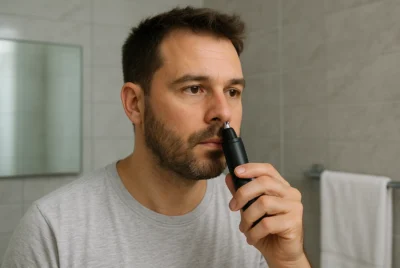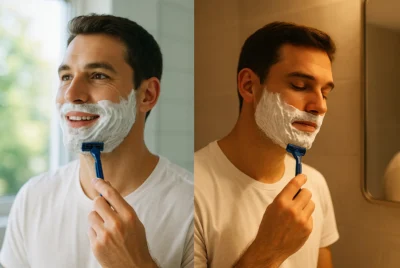Is Shaving Cream Toxic? Safety Tips and Non-Toxic Alternatives
Post Disclaimer
*We may earn a commission for purchases made using our links. Please see our disclosure to learn more.
Shaving is a daily routine for many, but have you ever wondered if the is shaving cream toxic? Some shaving creams contain chemicals that might not be the best for your health or the environment.
Here’s a fact to consider: certain ingredients in shaving creams, such as phthalates and sulfates, can pose risks not only to our skin but also to our overall well-being.
Our blog post will guide you through understanding which ingredients could be harmful and offer safer alternatives. We’ll help you find non-toxic options for a healthier shave. Ready to make a switch? Keep reading!
Harmful Ingredients in Shaving Cream
Shaving cream contains harmful ingredients like Triethanolamine (TEA), Parfum (fragrance), Polyethylene Glycol or PEG, Palmitic Acid, Isopentane, Glycols (propylene, butylene, and ethylene), Sulfates, Polytetrafluoroethylene, and Butylated Hydroxytoluene (BHT).
These ingredients can cause allergic reactions and irritation while also posing risks of chemical absorption and environmental impact.
Triethanolamine (TEA)
Triethanolamine (TEA) often appears in the list of ingredients for many shaving creams and other personal care products. This chemical serves as an emulsifier, helping oil and water to mix, creating a smoother texture for easy application on the skin.
Despite its common use, TEA has raised concerns among health professionals and consumers alike. Research suggests that it can cause allergic reactions, dryness, and irritation for some individuals.
Its presence is particularly troubling for those with sensitive skin or existing skin conditions.
The environmental impact of TEA also warrants attention. While not immediately toxic in small quantities found in consumer products, its widespread use adds to the accumulation of synthetic chemicals in our environment.
Experts urge choosing eco-friendly shaving cream substitutes and nontoxic grooming products to minimize health risks and protect ecosystems. By opting for natural shaving products or organic shaving cream options free from harmful chemicals like TEA, individuals contribute to a safer environment while ensuring their personal care routine does not compromise their health.
Parfum (fragrance)
Parfum (fragrance) in shaving cream can contain a mixture of various chemicals, including phthalates, which are often used to enhance fragrance. Phthalates have been linked to endocrine disruption and other health concerns.
These chemicals are not always listed on product labels due to the term “parfum” being considered proprietary information by many manufacturers. Therefore, when choosing a shaving cream or gel, it’s essential to opt for products that specifically state they are free from synthetic fragrances or phthalates.
Opting for fragrance-free or naturally scented shaving creams can be a safer choice as they reduce the risk of exposure to potentially harmful substances found in synthetic fragrances.
Polyethylene Glycol or PEG
Polyethylene Glycol (PEG) is commonly used in shaving creams as a thickening agent, binder, and solvent. PEG helps to give the product its creamy texture and makes it easier to spread on the skin.
It may also act as a humectant, helping to retain moisture in the skin. However, PEG can potentially pose risks due to contamination with harmful substances known as impurities such as ethylene oxide and 1,4-dioxane.
When choosing shaving cream products that contain PEG, it is essential to be mindful of potential contaminants and their effects on health. Research suggests that exposure to ethylene oxide and 1,4-dioxane may have adverse health implications including skin irritation and carcinogenic properties.
Palmitic Acid
Palmitic acid is a saturated fatty acid commonly used in the production of shaving creams and gels. It acts as an emollient, providing a smooth texture and enhancing the moisturizing properties of these products.
However, palmitic acid can be comedogenic for some individuals, meaning it has the potential to clog pores and contribute to acne breakouts. For those seeking nontoxic alternatives or with sensitive skin concerns, it’s important to look for shaving creams that are free from palmitic acid and instead opt for natural ingredients such as shea butter or coconut oil.
Moving on from palmitic acid, let’s explore the health risks associated with other harmful chemicals found in conventional shaving creams and the importance of considering non-toxic options.
Isopentane
Isopentane is a common ingredient in aerosol shaving creams and gels. This hydrocarbon compound provides the propellant function, assisting in dispensing the product from its container.
Isopentane can contribute to the product’s foaming action, making it easier to apply evenly onto the skin before shaving. However, it’s important to note that isopentane poses potential risks when inhaled and may be harmful if exposure occurs for an extended period.
Using products with isopentane can contribute to environmental impact due to its release as a volatile organic compound (VOC) into the atmosphere during use. Individuals seeking safer choices for shaving should consider alternatives without aerosols or those using more environmentally friendly propellants such as compressed air or non-aerosol pump dispensers.
Additionally, natural and eco-friendly options do not rely on synthetic chemical compounds like isopentane, offering safer choices for both personal health and environmental wellness.
Glycols (propylene, butylene, and ethylene)
Shaving cream may contain glycols such as propylene, butylene, and ethylene, which are used as conditioning agents or humectants. These ingredients help retain moisture in the skin to provide a smoother shaving experience.
However, it’s crucial to note that some individuals may be sensitive to these compounds, leading to skin irritation and allergic reactions. Propylene glycol is commonly found in aerosol shaving creams and can potentially dry out the skin.
Butylene glycol is often used in gel-based products for its hydrating properties, while ethylene glycol assists in improving product texture.
Given the possible adverse effects associated with these glycols, individuals seeking safer choices for their shaving routines should consider opting for nontoxic alternatives. Natural options like coconut oil or shea butter can offer moisturizing benefits without the use of synthetic chemicals.
Additionally, eco-friendly shaving creams formulated with plant-based ingredients present healthier substitutes that are both gentle on the skin and environmentally sustainable.
Sulfates
Sulfates, such as sodium lauryl sulfate (SLS), are commonly found in shaving creams and gels. These ingredients are known for their foaming and lathering properties, but they may also pose risks to both health and the environment.
Sulfates can cause skin irritation, especially for individuals with sensitive skin. Moreover, they have been linked to allergic reactions and can strip the skin of its natural oils, leading to dryness.
When choosing shaving products, look for options that are free from sulfates to reduce the risk of potential adverse effects on your skin.
Using shaving creams or gels without sulfates not only promotes healthier skin but also contributes to environmental sustainability. Sulfates have been associated with water pollution due to their ability to accumulate in aquatic environments.
Using nontoxic alternatives that do not contain these harmful chemicals is a safer choice for your personal grooming routine and helps minimize the impact on our planet’s ecosystems.
Polytetrafluoroethylene
Polytetrafluoroethylene, a synthetic fluoropolymer more commonly known as PTFE, is often used in shaving cream and other personal care products. This non-stick material helps create smooth and lubricated textures in the formulation of shaving gels and creams.
However, exposure to Polytetrafluoroethylene can pose health risks as it may contain perfluorinated chemicals (PFCs), which have been associated with potential adverse effects on human health and the environment.
The use of eco-friendly alternatives that do not contain PTFE or other harmful chemicals presents a safer option for both personal well-being and environmental sustainability.
Using shaving products free from Polytetrafluoroethylene along with other toxic ingredients such as sulfates, parabens, or synthetic fragrances is vital in promoting healthier choices for everyday self-care routines.
Butylated Hydroxytoluene (BHT)
Butylated Hydroxytoluene (BHT) is a common preservative in shaving creams and other personal care products. BHT may pose health risks, including allergic reactions and skin irritation, with some studies suggesting that it could be a potential carcinogen.
It’s important to look for nontoxic shaving products that are free from BHT and other harmful chemicals to reduce the risk of adverse effects on both personal health and the environment.
When using shaving cream containing BHT, individuals may experience allergic reactions or irritation due to this preservative. This underscores the importance of choosing safer alternatives made with natural ingredients or labeled as BHT-free.
Health Risks of Using Toxic Shaving Cream
Using toxic shaving cream can lead to allergic reactions, skin irritation, and the absorption of harmful chemicals into your body. These health risks make it crucial to consider safer alternatives for a healthier shaving experience.
Allergic reactions
Allergic reactions to toxic chemicals in shaving cream can cause redness, itching, and swelling of the skin. Some individuals may experience hives or a rash after using products containing harmful ingredients.
It is crucial to be aware of potential allergens such as fragrances and sulfates found in many shaving creams, particularly for those with sensitive skin. Phthalates, commonly present in these products, can also trigger allergic responses in some people.
Additionally, contact with the eyes during shaving increases the risk of irritation and allergic reactions due to chemical absorption through the delicate eye membranes. This poses a concern for overall health given that most symptoms resulting from exposure are due to allergic reactions rather than direct poisoning.
Irritation
Using toxic shaving cream can lead to irritation, particularly for individuals with sensitive skin. Some harmful ingredients in shaving cream, such as sulfates and fragrances, can cause redness, itching, and discomfort.
Shaving creams that are free from toxic chemicals and made with natural or organic ingredients can help reduce the risk of irritation. Choosing non-toxic alternatives can provide a gentler shaving experience while promoting healthier skin.
Moving on to “Chemical Absorption”.
Chemical absorption
Chemicals from shaving cream can be absorbed through the skin, potentially causing health issues. Sulfates, parabens, and other harmful ingredients may seep into the body during and after shaving.
These chemicals can enter the bloodstream and affect overall health. Phthalates, commonly found in shaving products, are known to disrupt hormone levels and have been linked to adverse reproductive effects.
It is essential for individuals, especially those with sensitive skin or concerns about toxic exposure, to opt for non-toxic alternatives when selecting shaving creams or gels. By choosing natural or eco-friendly options free of harmful chemicals like sulfates and parabens, it is possible to minimize the risk of chemical absorption while still achieving a smooth shave experience that is both safe for personal use and environmentally friendly.
Environmental impact
Toxic shaving cream chemicals, such as sulfates and butylated hydroxytoluene (BHT), can negatively impact the environment. These ingredients may end up in water systems, affecting aquatic life and ecosystems.
Additionally, aerosol products release harmful compounds into the air during use, contributing to air pollution. Choosing eco-friendly and nontoxic shaving products is crucial for minimizing these environmental effects.
By opting for natural ingredients or organic options for shaving gel and cream alternatives, individuals can reduce their ecological footprint while still enjoying a safe and effective grooming routine.
Furthermore, the disposal of traditional shaving cream packaging can also harm the environment. The plastic tubes used for packaging are often not biodegradable, adding to landfill waste.
Making an effort to select eco-friendly packaging or utilizing homemade alternatives can help mitigate this issue and lessen the overall environmental impact of personal care routines.
Non-Toxic Alternatives for Shaving Cream
Swap out toxic shaving creams for natural and eco-friendly alternatives. Consider various non-toxic options, including organic products and homemade substitutes.
Natural ingredients
Natural ingredients are a popular choice for those seeking toxin-free shaving products. Many natural options contain soothing and nourishing properties, such as aloe vera, coconut oil, shea butter, and essential oils like lavender or peppermint.
These ingredients can help to moisturize the skin and provide a smooth shave without exposing you to harsh chemicals often found in conventional shaving creams. With an array of natural alternatives available, it’s easy to make eco-friendly and healthy choices when it comes to your grooming routine.
Moving on from the benefits of using natural ingredients in shaving cream, let’s explore “Organic options” for safer shaving alternatives.
Organic options
Organic options for shaving creams and gels are becoming increasingly popular due to their natural ingredients and minimal environmental impact. Many organic shaving products contain nourishing elements such as aloe vera, coconut oil, shea butter, and essential oils like lavender and tea tree.
These ingredients provide hydration, soothing effects on the skin, and pleasant scents without the use of harmful chemicals or synthetic fragrances. When selecting an organic option, look for labels that indicate “certified organic” or “all-natural” to ensure you’re getting a product free from toxins.
By choosing these natural alternatives, individuals can protect their skin from potential irritants while also supporting sustainability in personal care practices.
Organic shaving options tend to be gentler on the skin and are suitable for people with sensitive skin types because they eliminate common irritating agents found in traditional shaving products.
Additionally, eco-friendly razors paired with organic shaving creams offer a conscientious approach towards personal grooming that aligns with reducing the overall environmental impact of disposable plastic razors and aerosol cans commonly used with traditional foams.
Eco-friendly products
Shaving cream with harmful ingredients can be replaced by eco-friendly products that are safer for both our health and the environment. These alternatives often consist of natural, non-toxic, and chemical-free components such as essential oils, plant-based extracts, and organic substances.
Such toxin-free shaving gel options provide a healthy substitute for traditional shaving creams while reducing the impact on personal well-being and the planet. Opting for these safe shaving cream options is especially beneficial for individuals with sensitive skin or those seeking self-improvement through healthier lifestyle choices.
Moreover, eco-friendly shaving cream substitutes not only provide a chemical-free alternative but also contribute to environmental sustainability. By choosing earth-conscious options tailored towards reducing waste production, individuals can actively promote personal health alongside environmental welfare.
With the rise in awareness about toxic ingredients in everyday products like shaving foam, non-toxic alternatives have become popular among men, women professionals alike who seek toxin-free solutions without compromising effectiveness or quality.
Homemade alternatives
You can create homemade shaving cream using natural ingredients like coconut oil, shea butter, and essential oils. This allows you to control the ingredients and avoid harmful chemicals found in commercial products.
DIY recipes often include simple pantry items, making it easy to tailor the product to your skin’s needs. Additionally, these alternatives contribute to a more eco-friendly and sustainable grooming routine while ensuring toxin-free care for your skin.
Making your own shaving cream means you know exactly what goes into it without exposing yourself to potentially harmful substances commonly found in mass-produced products. By utilizing everyday household items, you can craft a bespoke solution that is gentler on both your skin and the environment.
Tips for Safe Shaving
Choose shaving products with natural ingredients and opt for eco-friendly alternatives. Read on to discover more safety tips for a toxin-free shaving experience.
Read ingredient labels
When selecting shaving cream, read ingredient labels carefully. Look for nontoxic and eco-friendly options to promote personal and environmental health. Avoid products containing harmful chemicals like sodium lauryl sulfate (SLS), parabens, phthalates, and synthetic fragrances.
Choose natural ingredients such as aloe vera, shea butter, coconut oil, and essential oils for a safe and effective shave. By reading the ingredient labels on shaving products, you can make informed choices that contribute to a healthier lifestyle.
Consider using non-toxic alternatives that are free from harsh chemicals. Look for words like “organic,” “natural,” or “chemical-free” on product labels to ensure safer options. Keep in mind that some toxic substances may be listed under different names; for example, fragrance could refer to phthalates.
Choose nontoxic products
When selecting shaving cream, it is important to choose nontoxic products. Opt for shaving creams that are free from harmful chemicals like parabens, sulfates, and synthetic fragrances.
Look for natural and organic alternatives, as well as eco-friendly options labeled as toxin-free or chemical-free. By choosing nontoxic shaving products, individuals can reduce their exposure to potentially harmful ingredients while also minimizing the impact on the environment.
Taking this approach ensures a safer and healthier option for personal grooming routines.
Consider reading ingredient labels carefully when purchasing shaving creams to identify any toxic chemicals present in the product. Make informed decisions by seeking out eco-friendly and natural ingredients for your shaving needs.
Use a safety razor
When shaving, it is advisable to use a safety razor for a closer and smoother shave. Safety razors are designed to minimize skin irritation while providing an eco-friendly alternative to disposable plastic razors.
By using a safety razor, individuals can reduce their environmental impact by minimizing the waste generated from disposable blades and cartridges. This option not only promotes personal health but also aligns with eco-friendly and toxin-free grooming practices.
Making the switch to a safety razor is a simple yet effective step towards creating an environmentally conscious shaving routine.
Properly dispose of used products
Dispose of used shaving cream cans and other related products appropriately by recycling the containers and following local guidelines for hazardous waste or household product disposal.
Rinse residual shaving cream from the container before recycling, as this helps prevent contamination in the recycling stream. Additionally, consider using non-aerosol eco-friendly alternatives to reduce environmental impact further.
By properly disposing of used products, you contribute to reducing potential harm to both personal health and the environment while promoting sustainable practices.
Consider oil-based shaving methods
Oil-based shaving methods are a great alternative to traditional shaving creams, particularly for individuals with sensitive skin. Using natural oils like coconut oil, almond oil, or jojoba oil can provide a smooth and close shave while moisturizing the skin at the same time.
These oils create a protective barrier on the skin which helps prevent irritation and razor burn.
Some studies have shown that oil-based shaving methods can also help reduce ingrown hairs and provide additional benefits for individuals with acne-prone or dry skin. Moreover, these natural oils help to lubricate the skin and offer a more comfortable shaving experience without any harmful chemicals.
When considering your next shaving routine, it’s important to weigh the benefits of using non-toxic products in favor of traditional chemical-laden options. Embracing oil-based shaving methods not only promotes healthy skincare but also reduces our impact on the environment by minimizing exposure to harmful substances found in many conventional products.
Conclusion
Ensure your shaving cream is free from harmful toxins by opting for non-toxic alternatives. Choose eco-friendly products with natural ingredients and prioritize your health and the environment.
Make informed decisions, read labels, and use safety razors to promote a toxin-free shaving experience. Properly dispose of used products and consider oil-based shaving methods for a safer grooming routine.
FAQs
1. Is shaving cream toxic?
Some shaving creams contain chemicals that could be harmful over time, so it’s important to check the ingredients and consider nontoxic alternatives.
2. What are some safe alternatives to traditional shaving cream?
You can use eco-friendly or chemical-free options like toxin-free shaving gels, natural ingredient-based creams, or even a simple shaving soap.
3. Can I find eco-friendly substitutes for my sensitive skin?
Yes! There are many eco-friendly and chemical-free shaving cream substitutes designed specifically for people with sensitive skin.
4. How do I use non-toxic alternatives effectively?
Using a shaving brush with your chosen nontoxic or natural alternative can help create a rich lather and provide a smooth shave just as effectively as traditional products.
5. Where can I find these healthy substitutes for shaving cream?
Many health stores and online retailers offer a variety of toxin-free, ecofriendly, and chemical-free options for those looking to switch from conventional shaving creams.




